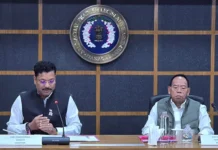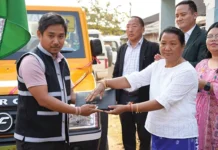ITANAGAR, Nov 20: The All Arunachal Pradesh Student’s’ Union (AAPSU) during a meeting with the President of India, Ram Nath Kovind on Monday has submitted a four-point memorandum, which included Chakma-Hajong and Tibetan refugee issue, Indo-Naga talk, loopholes in the State of Arunachal Pradesh Act, 1986 and boundary disputes and demarcation.
The Union said that it opposed any purported move to grant citizenship rights to Chakmas and Hajongs within the territory of Arunachal Pradesh and the implementation of the Tibetan Rehabilitation Policy (TRPA-2014) in the state.
The vexed issue of Chakma and Hajong refugees has been lingering since the last five decades and in the intermittent they have gained more ground by their shrewd network tactics with different constitutional bodies, and human rights organisations and have painted the innocent people of Arunachal Pradesh as oppressors in the eyes of the national and international community, it said.
The AAPSU has at different points of time vehemently opposed the indifferent attitude of the central government in the vexed issue of purported granting of citizenship rights to Chakmas and Hajongs without adequate protection to the indigenous people and Tibetan Rehabilitation Policy in the state.
Taking cognizance of popular aspiration, the AAPSU cannot tolerate any decision of the Centre which would hamper the integrity, dignity and security of the indigenous people of the state, the memorandum read.
“The Chakmas and Hajongs, in total disregard to the law of the land today have encroached upon the Namdapha National Park, and also have stared usurping local indigenous community land. They have started their own underground groups that are engage in heinous crimes, like murder, kidnapping, extortion, etc. Their exceptional population growth in comparison to the local indigenous tribes like Singphos, Khamtis and Tangsas is another major threat that has the potential to bring demographic imbalance” the Union added.
The Union further said that the Indo-Naga Political dialogue is shrouded in secrecy with no information coming out from any quarters, though the state of Arunachal Pradesh is one among the stake holders along with North Eastern states of Assam and Manipur.
The Union, while reiterating its earlier representation to the centre, said that any decision that is detrimental to the territorial integrity of the state will not be accepted.
It further said that the State of Arunachal Pradesh Act, 1986 contains such provisions, which go against the democratic norms and constitutional principles.
“Article 371(H) had been inserted in the Constitution of India that gives special responsibilities to the Governor of Arunachal Pradesh with regards to law and order. The Governor is authorised to exercise his individual judgement. It goes against the spirit of division of powers, and the capability and trustworthiness of the Council of Ministers are being doubted” it said.
The AAPSU further said that the Act contains the names of only 12 Scheduled Tribes, with some derogatory names as it called for inclusion of all tribes with proper nomenclature in the Scheduled Tribe list.
Names of tribes like Tangsa, Nocte and Wanchos need to be used instead of clubbing them under “Any Naga Tribe’, it added.
Calling for proper demarcation of the state, the Union added, “We have witnessed numerous incidents of violence in the past between Indian states as well as with the neighbouring countries. The peace and tranquillity of the people are at stake with confrontational undergrounds groups of Naga insurgents from Nagaland and Myanmar, besides ugly incidents of clashes among the people of Arunachal Pradesh and Assam”.


